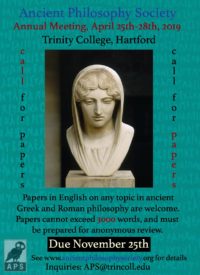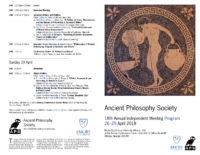Call for papers – Symposium Platonicum XII
Plato’s Parmenides
Paris, July 15th-20th 2019
The International Plato Society organizes a symposium on a single Platonic dialogue every three years. We are pleased to announce the Call for Papers for the XII Symposium Platonicum: Plato’s Parmenides.
The Symposium will take place July 15–20, 2019, in Paris. Although the dialogue has been the object of intense scholarly scrutiny, many issues remain to be explored. Submissions on any aspect of the dialogue, including its presocratic sources as well as later reception, will be considered. We also would like to encourage papers that address issues in the dialogue’s second half since it has received relatively less attention.
We welcome abstracts from all IPS members, full and associate. If you are not yet a member of the International Plato Society, criteria for membership and information about joining are available at: https://platosociety.org/
membership/. If you intend to submit an abstract, please make sure that your IPS dues are paid for 2016–19 at least one week before making your submission. If you are unsure whether you are a member in good standing, check the status of your account on the website or send an e-mail to web@platosociety.org.
Length
Papers should be suitable for 20-minute presentations, but authors may be asked to expand their papers to be presented at one of the 40-minute plenary sessions.
Your abstract should be 800–1200 words and you must submit versions in any two of the Society’s five official languages (English, French, Italian, Spanish, or German).
To ensure blind-review by the IPS Executive Committee please remove any identifying information from the abstract and the file properties. Any queries about the abstract should be sent to symposiumplatonicum12@
gmail.com. Deadline
All submissions must be received by September 30, 2018. Submitters will be notified of the Committee’s decision in January 2019.
How to submit your abstract
The submission process is entirely online at http://www.platosociety.
org/.
Yearly Archives: 2018
Ancient Philosophy Society 2019 Call for Papers

CALL FOR PAPERS
Ancient Philosophy Society
19th Annual Independent Meeting
Trinity College, Hartford
April 25th – April 28th, 2019
Honoring the richness of the American and European philosophical traditions, the Ancient Philosophy Society welcomes submissions from a variety of interpretive perspectives. Phenomenological, postmodern, Anglo-American, Straussian, Tübingen School, hermeneutic, psychoanalytic, queer, feminist, and any other interpretations of ancient Greek and Roman philosophical and literary works are encouraged.
Please submit papers for anonymous review by email attachment to APS@trincoll.edu. Deadline: November 25th, 2018. The author’s name, institution, and references pertaining to the identity of the author must be omitted from the paper, notes, and bibliography. The email accompanying the submission must include the author’s name, the title of the paper, address, telephone, email address, and institutional affiliation.
- Papers must be written in English. Submission must be entirely the author’s own unpublished work that, where appropriate, acknowledges the contributions of others.
- Papers may not exceed 3,000 words (30 minutes reading time, max.), exclusive of footnotes and bibliography. Longer papers will not be forwarded to the Program Committee.
- Because papers selected for presentation are collected and provided to meeting participants in a single Proceedings, please observe the following conventions: Times New Roman, single-spacing, 1-inch margins on all sides, pages numbered, 12-point font for text, 10-point for footnotes.
- Papers should be submitted in PDF.
- Receipt of papers will be acknowledged by email.
- Only one submission per author will be considered.
- No one may present a paper in consecutive years.
All papers are reviewed by an anonymous Program Committee selected by the Host and Executive Committee to represent the range of interpretive traditions. Decisions will be reached in January 2019, and authors will be notified by email. You do not need to be a member of the society to submit a paper, but you must join the society to be on the program.
The APS values diversity in its membership as well as in its scholarly perspectives. We particularly invite submissions from members of groups underrepresented in philosophy, including women, people of color, LGBTQI individuals, and people with disabilities. The APS conference is wheelchair accessible.
In keeping with this commitment to diversity, the APS will award two prizes of $300 each:
- The Diversity Prize: awarded to the best paper that is chosen for the program through the anonymous selection process written by a person from a group underrepresented in the discipline. Please self-identify in the body of your email when you submit your paper, saying, “I would like to be considered for the Diversity Prize after the program selection process.” Please keep your paper free of any identifying information.
- The Emerging Scholar Prize: awarded to the best paper that is chosen for the program through the anonymous selection process written by a scholar who is either ABD or up to 3 years post Ph.D. Please self-identify in the body of your email when you submit your paper, saying, “I would like to be considered for the Emerging Scholar Prize after the program selection process.” Please keep your paper free of any identifying information.
- Scholars may be considered for both prizes but can only be awarded one.
For current information about the meeting, as well as membership information, consult the APS website: www.ancientphilosophysociety.org.
Please direct all inquiries to Dr. Shane Ewegen at APS@trincoll.edu
Advice for people attending the APS at SPEP
For anyone attending the A.P.S. session at S.P.E.P. this year, S.P.E.P. is being held at Pennsylvania State during Parent’s Weekend. For this reason space in the area will be at a premium. You are strongly encouraged to make your reservations and accommodation arrangements as soon as possible.
New Journal for 2019 – Ancient Philosophy Today: DIALOGOI

Ancient Philosophy Today: DIALOGOI provides a forum for the mutual engagement between ancient and contemporary philosophy.
The journal aims to fruitfully connect interpretive work in ancient philosophy to current discussions in metaphysics, epistemology and ethics, and to assess the continuing relevance of ancient theories to current philosophical interests and debates.
Print ISSN: 2516-1156
Online ISSN: 2516-1164
https://www.euppublishing.com/loi/anph
Glaucon’s Fate: History, Myth, and Character in Plato’s Republic

In the Republic, Socrates seeks to convince Plato’s brother Glaucon that the just life of philosophy is preferable to the unjust life of tyranny. Jacob Howland’s Glaucon’s Fate argues that he fails. The available evidence suggests that Glaucon joined his cousin Critias and his uncle Charmides in the regime of the so-called Thirty Tyrants, the brutal oligarchy that governed Athens in the immediate aftermath of the Peloponnesian War. If Howland is right, Plato’s intelligent and courageous brother—suspended as he was between the corruption of Athenian politics and the integrity of Socratic inquiry, between kinsmen who were leaders of the Thirty and a just friend who fell afoul of them—could not be saved even by the age’s most capable advocate of virtue and philosophy.
What went wrong? Howland’s exploration of this guiding question focuses on Socrates’ rivalry with Critias, with whom he competes for the attention of ambitious young aristocrats. The contrast between these two men is stark. Socrates offers young souls an escape through philosophy from the Cave of the city; Critias offers them a path to rule. Socrates’ erotic path is reliant on the knowledge of one’s ignorance and neediness; Critias’s thumotic one is rooted in the presumption of an abstract and impersonal perfection. Socrates seeks truth; Critias supposes he already possesses it. Yet in the Republic, Socrates professes admiration for Callipolis, a totalitarian regime strikingly similar to the one implemented in Athens by the Thirty. Why would he do so? What responsibility does he have for Glaucon’s fate? What was he hoping to achieve when he accompanied Glaucon to the Piraeus, and what does he accomplish in the Republic? In approaching these questions, Glaucon’s Fate examines the historical and literary context of the Republic—including Critias’s thought as presented in his own writings and in Plato’s Timaeus-Critias and Charmides—and explores the relationship between myth, character, action, and argument in the dialogue itself.
Glaucon’s Fate will be published by Paul Dry Books in November of 2018.
APS 2018 Conference Program

The program for our 2018 meeting at Emory University in Atlanta, Georgia is now available. It can be viewed and downloaded here:
We look forward to seeing you.
The Emerging Good in Plato’s Philebus

Plato’s Philebus presents a fascinating dialogue between the life of the mind and the life of pleasure. While Socrates decisively prioritizes the life of reason, he also shows that certain pleasures contribute to making the good life good. The Emerging Good in Plato’s “Philebus” argues that the Socratic pleasures of learning emphasize, above all, the importance of being open to change.
John V. Garner convincingly refines previous interpretations and uncovers a profound thesis in the Philebus: genuine learners find value not only in stable being but also in the process of becoming. Further, since genuine learning arises in pluralistic communities where people form and inform one another, those who are truly open to learning are precisely those who actively shape the betterment of humanity.
The Emerging Good in Plato’s “Philebus” thus connects the Philebus’s grand philosophical ideas about the order of values, on the one hand, to its intimate and personal account of the experience of learning, on the other. It shows that this dialogue, while agreeing broadly with themes in more widely studied works by Plato such as the Republic, Gorgias, and Phaedo, also develops a unique way of salvaging the whole of human life, including our ever-changing nature.
Perception in Aristotle’s Ethics

Perception in Aristotle’s Ethics seeks to demonstrate that living an ethical life requires a mode of perception that is best called ethical perception. Specifically, drawing primarily on Aristotle’s accounts of perception and ethics in De anima and Nicomachean Ethics, Eve Rabinoff argues that the faculty of perception (aisthesis), which is often thought to be an entirely physical phenomenon, is informed by intellect and has an ethical dimension insofar as it involves the perception of particulars in their ethical significance, as things that are good or bad in themselves and as occasions to act. Further, she contends, virtuous action requires this ethical perception, according to Aristotle, and ethical development consists in the achievement of the harmony of the intellectual and perceptual, rational and nonrational, parts of the soul.
Rabinoff’s project is philosophically motivated both by the details of Aristotle’s thought and more generally by an increasing philosophical awareness that the ethical agent is an embodied, situated individual, rather than primarily a disembodied, abstract rational will.
EVE RABINOFF is an assistant professor of philosophy at the University of Minnesota, Duluth.
“Stimulating and insightful, this is a very important book on Aristotle’s claims about ethical life and its relation to embodiment, and issues of ethical life more generally. The book stands on its own as a major contribution to this literature.” –Drew A. Hyland, author of Questioning Platonism: Continental Interpreters of Plato and Plato and the Question of Beauty